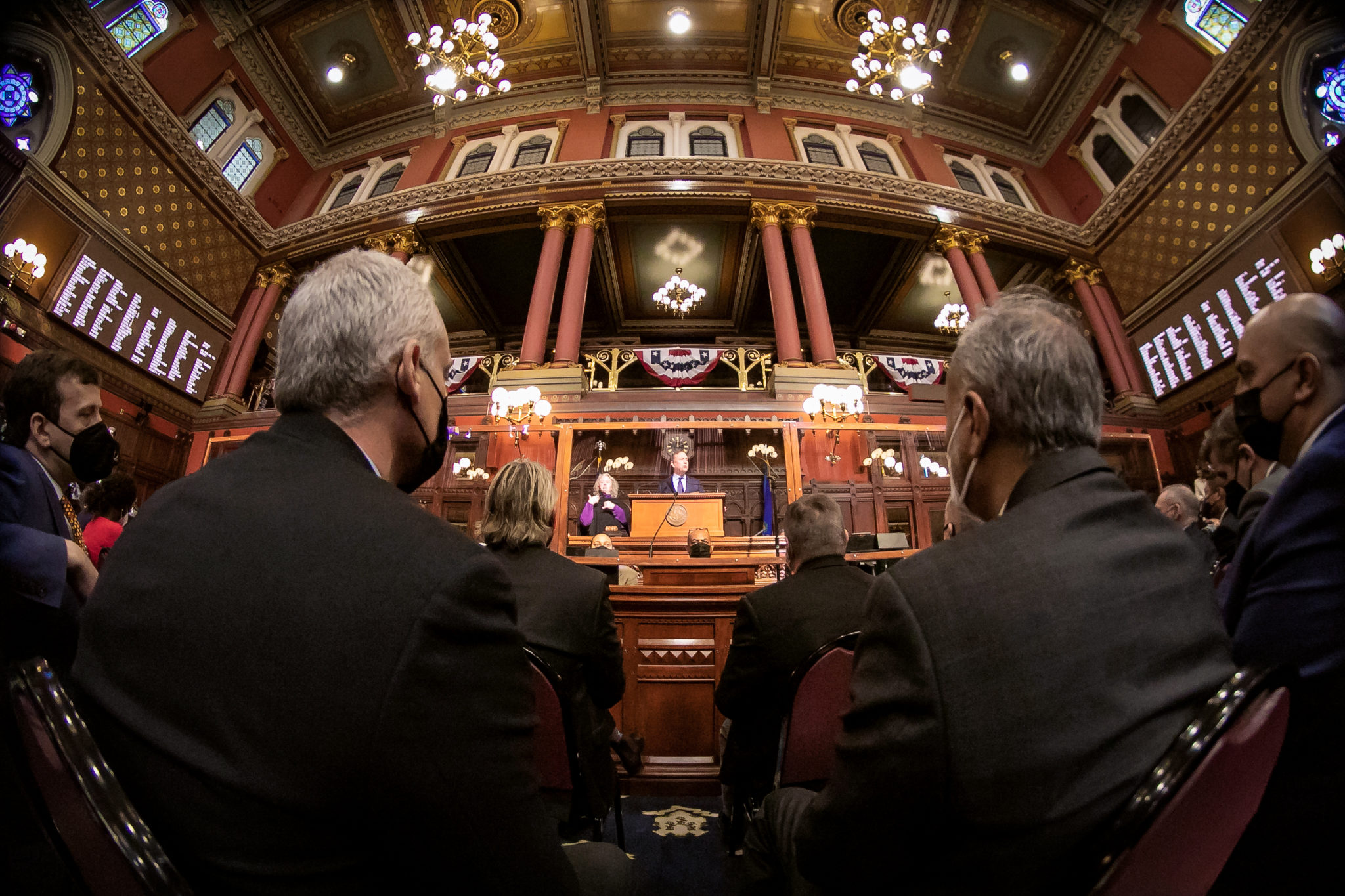Connecticut lawmakers unanimously pass bill to cut 25 cent gas tax
House Bill 5501 suspends the state’s excise tax on gasoline from April 1 to June 30. The legislation also suspends bus fare fees and creates an additional sales tax holiday.

Courtesy of Brian M. O’Connor, Connecticut House Democratic Office
A bipartisan group of lawmakers voted unanimously to suspend the state’s gas tax after rising inflation and Russia’s invasion of Ukraine made prices skyrocket at the pumps.
Last Wednesday, the Connecticut State Senate and House of Representatives unanimously passed HB 5501, which suspends the state’s 25 cent excise tax on gasoline from April 1 to June 30. The bill also suspends the state’s 6.35 percent sales tax on clothes and foods under $100 during the week of April 10 to April 16 and makes all public buses in the state free for the same period as the gas tax suspension. The emergency bill bypassed the committee process and was introduced by the Democratic and Republican leaders of both houses. It was signed into law by Governor Ned Lamont on Thursday morning.
Some Republicans in the state house questioned why the bill did not include a tax reduction for diesel gas alongside traditional unleaded gas. Additionally, some Democrats floated the idea of adding amendments to add incentives for electric car owners and a higher earned-income tax credit for poorer families.
State legislative leaders have pointed to inflation and the Russian invasion of Ukraine earlier this month as a cause of the surge in gas prices across the nation and state. According to the Connecticut AAA, the average price of a gallon of unleaded gas was $4.308 on Tuesday. This time last year, the same gallon of gas cost $2.894. This time last month, a gallon of gas would have cost Connecticuters $3.723 last month.
“This bill is important to provide relief to working families, seniors, college students, and others who drive cars or trucks or utilize mass transit,” State Senate Majority Leader Bob Duff (D-Norwalk) told the News. “The bill will provide needed relief from high gas prices and, and higher prices in general. And so I’m glad that we were able to get this done with bipartisan support.”
Unlike most other states, there are two taxes levied on gasoline in Connecticut. There is an 8.1 percent petroleum products gross earnings tax alongside the state’s traditional “gas tax,” the 25-cent-per-gallon motor vehicle fuels tax, the latter of which was suspended by the passage of HB 5501.
Gas stations bear the imposition of both taxes. They subsequently raise prices on consumers so that they do not lose profit. Under the provisions of HB 5501, gas stations that do not reduce their prices once the tax suspension commences on April 1 will be committing unfair and deceptive trade practices and subject to punishment.
According to Duff, the bill will save state residents roughly $90 million from the suspension of the gas tax, and the state plans to pick up the tab for this through reallocating funds from the state’s transportation fund, which currently has a $500 million surplus.
Initially, Lamont and several lawmakers hesitated to suspend the gas tax, expressing concerns about the suspension’s impact on the budget surplus, which they hoped to use to fund infrastructure projects.
Politicians continue to disagree as to what additional steps are necessary to provide economic relief to Connecticut families. Many Republicans, including Senate minority leader Kevin C. Kelly (R-Shelton), believe that the legislature ought to exempt farmers from the highway use tax. They think that the tax, which targets large commercial trucks, is an additional, trivial cost that unnecessarily burdens farmers.
According to Speaker of the State House Matthew Ritter (D-Hartford), The highway use tax, which will go into effect from January 2023, is a levy between 2.5 to 17.5 cents per mile depending on the weight of the truck and is part of the long term fiscal strategic plan of the state to reduce its budget deficit. The Democratic caucus has ruled out any consideration of suspension of the tax at this time
“We should exempt farmers and food because that’s a necessity,” Kelly said to the News. “The state’s finances are as solid as I’ve seen in the past decade. Given the fact that this tax wasn’t identified for any purpose, other than just to tax because the majority could, I think it needs to be evaluated and removed.”
For the week of April 10 through April 16, consumers in Connecticut will not have to pay sales tax on clothing and footwear that costs less than $100. Typically, Connecticut has one weeklong tax vacation per year in August around the time of back-to-school shopping. According to State House Majority Leader Jason Rojas (D-East Hartford), this sales tax suspension has been timed with the majority of spring breaks for public schools across the state to ensure maximum savings for families and consumers in the state.
According to Duff, the sales tax holiday is estimated to save Connecticut residents about $10 million and will be paid for by money left over from the American Rescue plan.
The legislation also allocates funds for free public bus services from April 1 to June 30, the same time window for when the gas tax is suspended. This section of the bill is designed to help ease financial difficulties for working families who use public transport to commute.
Connecticut joins several other states, including Georgia, Maryland and Minnesota, in its temporary suspension of the statewide gas tax. A few weeks ago, Connecticut’s senior Senator Richard Blumenthal called for a national suspension of the $0.18 federal gas tax. However, federal efforts have less political momentum than piecemeal statewide efforts. Notably, not all states are in accord about cutting the tax. In Massachusetts, for example, a recent bill to suspend the gas tax failed to pass the senate.
Governor Lamont signed the bill into law on Thursday.







